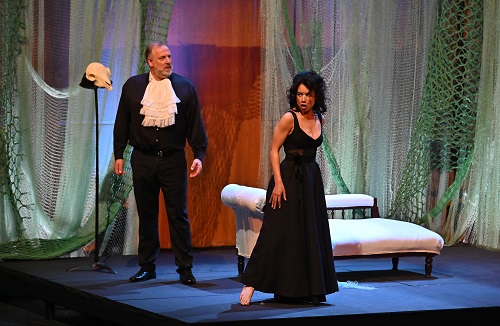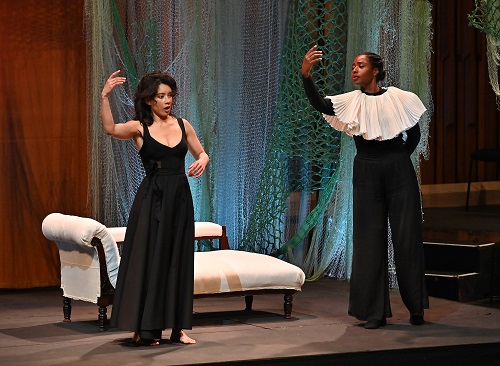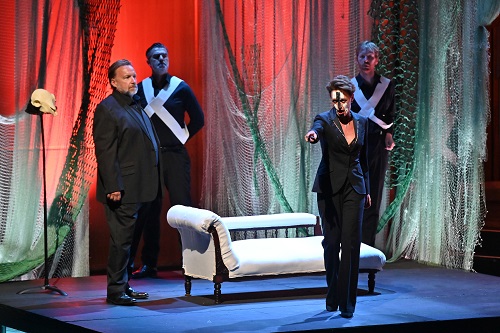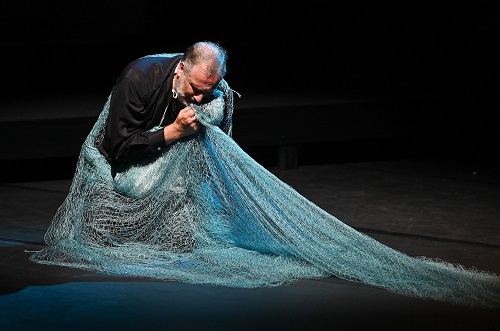If you’re a fan of postmodern magic realistic fiction – think Salman Rushdie, Italo Calvino, Gabriel García Márquez et al – then you’ll love Errollyn Wallen new opera Dido’s Ghost, which was premiered on Sunday evening at the Barbican Centre. In Wesley Stace’s libretto fiction, fact and myth collide; characters stray between past and present, life and death; narratives nestle within narratives.
Billed as a ‘sequel’ to Purcell’s Dido and Aeneas, Wallen’s new opera is more an assimilation of the seventeenth-century score and a re-imagining of Greek myth. In Vergil’s telling of Dido’s tragic love and death, Dido’s sister Anna initially encourages her to marry Aeneas, for this will strengthen Carthage, and then serves as Dido’s messenger, pleading, to no avail, with the Trojan prince to stay. But Ovid tells of a legend that links Anna to the goddess Anna Perenna – the Roman deity of the ‘circle’ of the year – and recounts how, following Dido’s death, Anna takes refuge first on the island of Malta and then, when forced to flee once more, in Lavinium, the settlement that is ruled by Aeneas, with whom Anna falls in love. As his wife Lavinia grows ever more jealous, Dido appears to Anna in a dream and warns her of Lavinia’s violent scheming. Anna rushes off into the night, falls into the river Numicus and drowns, becoming the river nymph hidden in the ‘perennial stream’ (amnis perennis) of Numicus. Her name thus becomes Anna Perenna.

This is Wallen’s and Stace’s starting point. The shipwrecked Anna washes up on the shores of Lavinium – a “pretty memory appears from Widow City”, we are told – and Lavinia isn’t too pleased to be urged by Aeneas, “Please welcome her and love her as a sister”. “Is she his past come back to haunt him?” she spits, and, with her spy, Elymas, begins her plotting. She mounts a masque entertainment – Purcell’s Dido and Aeneas, naturally – and Belinda (the Spirit of the Theatre) beckons Anna onstage to assume the role of ‘Dido’. Not happy on the side-lines, watching her husband re-live his past romance, Lavinia muscles in on the action, painting her face with satanic stripes and stepping into the role of the Sorcerer’s Spirit. Past and present unfold simultaneously, characters are themselves and not themselves, fate takes its course, and, needless to say, it doesn’t end happily.
Director Frederic Wake-Walker’s staging was necessarily economical. A chaise longue was perched on a raised platform, the latter draped in delicate green. The chorus and stagehands occasionally wielded some green fishing-nets. That’s about it. The lighting worked hard and effectively.

Wallen’s score is a slick amalgam of musical styles and voices. Purcell’s continuo is supplemented with a large percussion section and electric guitar, the glissandi and twangs injecting a dramatic edginess during the initial musical account of the storm and shipwreck à la Tempest. But, just as the fluidity of time and the shapeshifting of character can sometimes confuse, so the restless segueing between musical idioms starts to take on the rootlessness of Anna’s search for a safe haven. And, the re-workings of Purcell’s ground bass forms, though initially interesting, become a bit repetitive, unbending when compared to Purcell’s infinite invention and re-invention. We hear elements from Purcell’s opera interwoven into the fabric from the start, but the embracing of the near-entirety of Dido is rather ‘risky’: how lovely it was to settle and absorb, at last, a singular musical voice.

In her vocal writing, Wallen at times finds a musical rhetoric reminiscent of the emotive heights of Greek tragedy but it can tip into hyperbole. Allison Cooke’s Lavinia perhaps suffers most, but Cooke valiantly negotiated the unforgiving extremes and was matched for power and weight by Henry Waddington as Elymas and the Sorcerer. Isabelle Peters, replacing the indisposed Golda Schultz, was somewhat overshadowed by their vocal heft, but her light soprano is attractive, and she blended beautifully – in song and stylised action – with Nardus Williams’ Belinda. Williams gave a stand-out performance: graceful of voice and movement, compellingly expressive, she communicated a very human emotional intensity. David Lee was a fine Ascanius and Jessica Leary (Second Woman), Jessica Gillingwater (First Witch), Judy Louie Brown (Second Witch) stepped forward from the vibrant Chorus to fulfil their solo roles with accomplishment and strong character. Conductor John Butt held the kaleidoscopic elements together with impressive focus, and the Dunedin Consort played with characteristic vividness, relishing the dynamic counterpoint, melodic rhetoric and rhythmic spring.

And, what of Aeneas, tormented by loves lost, past and present. Vergil’s narration focuses on Dido’s own love and death, rather than the object of the passion which is her tragedy; Aeneas is depicted as having made the right decision in leaving Dido in order to safeguard the future of Rome, and while he feels pity for Dido’s ‘unjust fate’, he does not regret his choice. Wallen and Stace, however, bring Aeneas in from the shadows, imbuing the Trojan prince with more substance, sincerity and sensibility, and bass-baritone Matthew Brook gave an outstanding performance as the man forced, simultaneously, to re-live his past and re-examine his present. As his two loves, now immortal goddess, were united and eternally entwined, so Brook’s Aeneas was emotionally rent asunder. What else could he do but plead, “Remember me”. Brook’s moving rendition of Dido’s lament, by turns beautifully gentle and intensely anguished, was a song of submission and self-sacrifice, as he enshrouded himself in the fishing-nets and offered himself to the Numicus’ depths.
The Dido’s Ghost stream will be available to watch until Tuesday 8th June at 8pm. Dido’s Ghost will be performed at the Buxton International Festival on 11th, 14th and 17th July (buxtonfestival.co.uk) and at the Edinburgh International Festival on 20th– 22nd August (eif.co.uk).
Claire Seymour
Dido – Isabelle Peters, Aeneas – Matthew Brook, Belinda – Nardus Williams, Lavinia – Allison Cook, Elymas/Sorcerer – Henry Waddington, Ascanius – David Lee, Second Woman – Jessica Leary, First Witch – Jessica Gillingwater, Second Witch – Judy Louie Brown; Director – Frederic Wake-Walker, Conductor – John Butt, Dunedin Consort
Barbican Hall, London; Sunday 6th June 2021.
ABOVE: Isabelle Peters (Dido) (c) Mark Allan / Barbican